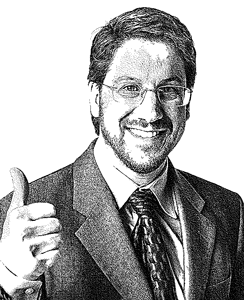
Barry Bunin, PhD
Founder & CEO
Collaborative Drug Discovery
"How a Japanese Drugmaker Got the Clean Win Over Alzheimer's." That headline in a recent Bloomberg article argues for optimism. "After 30 years, lecanemab proved that the patient's condition can be improved by removing amyloid beta," Eisai Chief Executive Haruo Naito said. [The results] "prove the amyloid hypothesis." Over at Science, Derek Lowe headlined his recent blog "A Positive Amyloid Trial, Finally?" Lowe expresses hope that lecanemab, which Eisai is partnering with Biogen to bring to market, works as well as initial trials indicate because of the devastation Alzheimer's inflicts on patients and their families. But he also voices caution. "At the same time, though, news like this needs to be examined carefully," Lowe writes. "As the world knows, the anti-amyloid clinical landscape for Alzheimer's is absolutely littered with failures in every direction: anti-amyloid antibodies of various types, attempts to inhibit beta-secretase and gamma-secretase enzymes, attempts to prevent aggregation, you name it. Nothing has worked. The presumption at this point is that such therapies will not succeed, so if lecanemab has indeed worked, the question is what makes it different."
* * *
After Watson, It's Elemental … with an Eye Toward AI-Assisted Drug Discovery. Some folks may recall when IBM sold Watson Health to Francisco Partners - and the resulting chatter. David Ferrucci, who led the team that built IBM's famed Watson computer, and founder of the AI startup Elemental Cognition, is trying to add human-type common sense to the computational power of AI and machine learning to, among other things, aid in drug discovery. The New York Times recently profiled his efforts in an article headlined "One Man's Dream of Fusing A.I. With Common Sense." The goal, the article says, is that AI "becomes a trusted 'thought partner,' a skilled collaborator. … The start-up is beginning to commercialize the technology, initially offering companies A.I.-powered assistants in fields like customer service for travel and research for drug discovery."
* * *
Want Better Drug Delivery? Put it in a Miniature Boat, and Don't Forget the Anchor. "Bacterial Boats Deliver Drugs," is the headline for a recent article in Drug Discovery News about researchers exploring a new mechanism to deliver a cancer drug with a longer half-life "using a surprising new drug delivery vehicle: bacteria." The article reports on a recent study published in Science Advances by Diptiman Choudhury, a biochemist at the Thapar Institute of Engineering and Technology, whose team created a "bacterioboat" system that encapsulates drug-loaded nanoparticles in the biofilm coating of L. reuteri bacteria. This biofilm contains sugars and mucus-binding proteins that enable the therapeutic bacteria to anchor within the intestinal lining for multiple days, promoting sustained release of the drug from the biofilm coating. Drug Discovery News quotes Quanyin Hu, a pharmaceutical scientist at the University of Wisconsin-Madison who was not involved with the study, as saying: "This will generate a significant impact in either academia or industry fields because it has the potential to decrease the dosing of the drug and potentially enhance the treatment efficacy."
* * *
"Don't Junk DNA as Study Shows New Role in Brain Disease." That's the headline in a recent FIERCE Biotech article about the controversially named "junk" DNA, the 98% of the genome that doesn't code for proteins. The article reports that "Researchers at the University of Sheffield have discovered that junk DNA, or non-coding DNA, also breaks-and, if it isn't repaired, can contribute to the development of neurodegenerative disease. They hope their findings will lead to the identification of disease biomarkers along with new therapies." Sherif El-Khamisy, chair in molecular medicine at the University of Sheffield is quoted as saying: "Until now the repair of what people thought is junk DNA has mostly been overlooked, but our study has shown it may have vital implications on the onset and progression of neurological disease. … The significance of repairing DNA breaks in the invisible non-coding genome will open up a whole new field of research including new targets for therapeutic interventions and biomarkers. By therapeutically targeting components of the pathway it may help us delay or treat neurological diseases such as dementia."
=
Barry A. Bunin, PhD, is the Founder & CEO of Collaborative Drug Discovery, which provides a modern approach to drug discovery research informatics trusted globally by thousands of leading researchers. CDD Vault® is a hosted biological and chemical database that securely manages your private and external data.
Other posts you might be interested in
View All Posts
CDD Blog
7 min
February 26, 2025
A Buyer’s Guide for Scientific Data Management Platforms
Read More
CDD Vault Updates
3 min
February 22, 2025
CDD Vault Update (February #2 2025): Advanced Macromolecules - Modified Bioconjugates Support in CDD Vault
Read More
CDD Vault Updates
2 min
February 15, 2025
CDD Vault Update (February 2025): Line Graphs, Search Inventory by Location, Exposed Sample Names, Expand Bioisostere Suggestions
Read More


